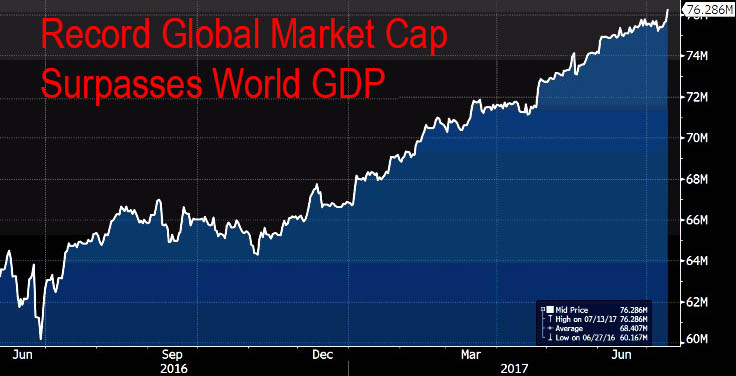It was another painfully low-volume overnight session, which however did not prevent global stocks from hitting another record highs, capping their best week in over two months as the dollar stayed close to nine-month lows following Yellen’s dovish retreat in which she noted caution on persistently low inflation (hence today’s CPI print will be especially important) as odds of future rate hikes in 2017 and 2018 dropped.

“(The Fed comments) add to our conviction that no further Fed hike should be expected for the rest of the year, which should prove reassuring for markets concerned about excessive tightening risk globally,” Mizuho’s head of euro rates strategy Peter Chatwell said in London.
European equity markets trade broadly flat, FTSE 100 underperforms with healthcare sector lagging as uncertainty on AstraZeneca (-1.6%) CEO grows. The pan-European STOXX 600 index inched up 0.1%, adding to earlier gains on stock markets in Asia that took MSCI’s world stock index to an all-time high. European shares were poised for their best week since late April as investors piled back into the Stoxx 600, though moves on indexes on Friday were largely muted for now.

Earlier, Japan’s Nikkei added 0.2%, poised for a weekly rise of just over 1 percent. MSCI’s broadest index of Asia-Pacific shares outside Japan advanced 0.3 percent to its highest level in two years.
S&P 500 index futures were little changed after financial shares led gains yesterday with three large banks slated to deliver earnings Friday, although all eyes will be on today’s CPI print for validation of Yellen’s recent dovishness.
Leading into today’s US CPI print yesterday’s PPI report in the US was a bit of a mixed bag. Headline PPI rose +0.1% mom in June which was a tenth ahead of expectations however base effects have seen the annual rate slip to +2.0% yoy from +2.4%. The more significant core (ex food and energy) reading rose +0.1% mom which was a slight miss (+0.2% expected). That puts the annual rate now at +1.9% yoy and down from +2.1% in May (which was the highest since May 2014). Of note in the report was healthcare costs which rose a fairly modest +0.1% mom. This should point to a similar rise in the component for the PCE deflator.
DB economists expect headline and core CPI to have risen +0.1% mom and +0.2% mom respectively which is also in line with the market consensus. Should their forecast be close to the mark then the year over year growth rate of core CPI would rise a tenth to +1.8% which would be mildly positive for dovish-leaning policymakers fretting about recent soft inflation. That would also be one-tenth ahead of the consensus. However, it is worth noting that core CPI has missed expectations for the last three months and the 3m average surprise has dropped to the lowest (-0.17%) since June 2005 (when it was the same level). So it’ll be interesting to see if today bucks the trend.
Bonds posted a modest rebound while US stock futures were marginally in the red ahead of a US data deluge which includes the start of earnings season when JPM, Wells and PNC post Q2 results, coupled with data deluge from the US including inflation data, retail sales, industrial production and UMich consumer confidence.
Stocks weren’t the only thing to benefit from Yellen’s dovishness: Treasuries headed for their first weekly gain in three while Bunds rose for the first day in four. Likewise in Europe, bonds rebounded after yields bounced in the past few weeks in the euro zone on rising expectations that the European Central Bank is set to wind down its asset purchase program.The German 10-year yield fell some 3 basis points when European trading started on Friday to 0.50%, moving away from an 18-month high hit earlier this week of 0.583 percent.
The Bloomberg Dollar Spot Index fell for the fifth day, its longest streak of losses in two months and set for another weekly decline, near the lowest level since September 2016. The dovish signals from the Fed also pressured the broader DXY index on Thursday and it stayed close to that trough, inching down 0.1 percent on the day.The yen was on the back foot against high-yielding currencies such as the Australian dollar as the VIX index drifted lower and provided a boost to carry trades. There was some excitement in FX land where the AUD/USD pushed to a new YTD high with similar price action observed in EUR/CHF which also hits YTD high as CHF weakened across the board. The euro was up 0.1 percent at $1.1415 and was set to end the week flat.
“The latest comments from Yellen and others suggest that interest rates will rise very gently, and that is supportive for high-yielding currencies for now,” said Viraj Patel, an FX strategist at ING Bank in London.
A quick recap of overnight trading sessions courtesy of Bloomberg:
In commodities, Brent, WTI edged higher for the fifth day as Shell declared force majeure on Nigeria’s Bonny Light crude exports, as the market looks ahead to rig count data later on Friday. “We have the rig count later today, so it will be interesting to see if that drop two weeks ago was a one-off, or if we are seeing signs of stabilization,” says Jens Pedersen, senior analyst at Danske Bank, adding that the market is stabilizing after “a bumpy week” in which prices fluctuated on OPEC, EIA and IEA reports. “We have some interesting U.S. key figures due this afternoon which could move the dollar,” including inflation data, Pedersen said. Gold was steady at $1,217.32 an ounce, heading for a half-percent gain for the week.














Leave A Comment